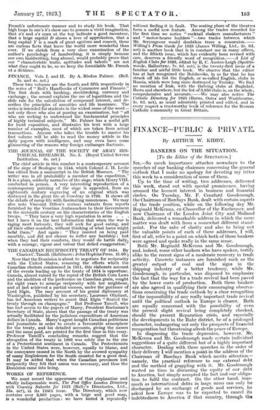Charles C. Tansill. (Baltimore: John Hopkins Press. $1.00.) Now that
the Dominion is about to negotiate for reciprocity with the United States, resuming the efforts which the Canadian electors condemned in 1911, this elaborate account of the events leading up to the treaty of 1854 is opportune. Canada, almost ruined by the repeal of the British Corn Laws and the abolition of the preference on Canadian grain, sought for eight years to arrange reciprocity with her neighbour, and at last achieved a partial success, under the guidance of Lord Elgin. The racy account of his genial diplomacy at Washington, published by his secretary, Laurence Oliphant, has led American writers to assert that Elgin " floated the treaty through on champagne." But Professor Tansill, who has had access to the papers of Marcy, President Buchanan's Secretary of State, shows that the passage of the treaty was actually facilitated by the judicious expenditure of American dollars in Canada. Marcy's agent bought Canadian politicians and journalists in order to create a favourable atmosphere for the treaty, and his detailed accounts, giving the names and the sums paid, are printed for the first time in this essay. Professor Tansill's concluding remarks suggest that the abrogation of the treaty in 1866 was solely due to the rise of a Protectionist sentiment in Canada. The Protectionists in the United States were however, equally to blame, and the annoyance caused in the North by the avowed sympathy of many Englishmen for the South counted for- a good deal. It may be added that when the Canadian provinces lost reciprocity they felt that union was necessary, and thus the Dominion came into being.










































 Previous page
Previous page